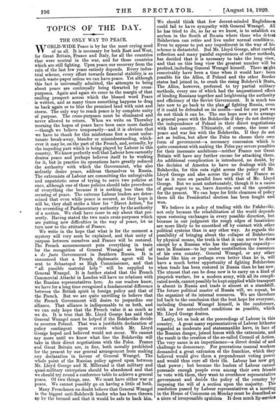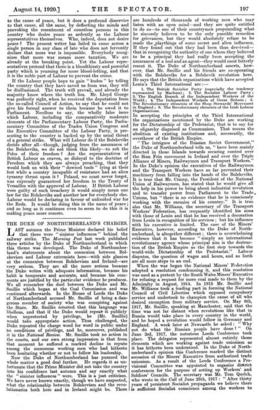TOPICS OF THE DAY.
THE ONLY WAY TO PEACE.
WORLD-WIDE Peace is by far the most crying need of us all. It is necessary for both East and West, for Great Britain, France and Italy, for all the countries that were neutral in the war, and for those countries which are still fighting. Upon peace our recovery from the ruin of the last few years entirely depends. Every indus- trial scheme, every effort towards financial stability, is so much waste-paper unless we can have peace. Yet although this fact is universally admitted, the attempts to bring about peace are continually being thwarted by cross- purposes. Again and again we come to the margin of that smiling prospect across which the blessed word Peace is written, and as many times something happens to drag us back again or to blur the promised land with mist and storm. The only way to reach peace is by complete unity of purpose. The cross-purposes must be eliminated and never allowed to return. When we write on Thursday morning the hopes of peace have been once more dashed —though we believe temporarily—and it is obvious that we have to thank for this misfortune first a most unfor- tunate break-away, blinder or misunderstanding, which- ever it may be, on the part of the French, and, secondly, by the impeding part which is being played by Labour in this country. We know perfectly well that Labour here earnestly desires peace and perhaps believes itself to be working for it, but in practice its operations have greatly reduced the authority with which the Government, who also ardently desire peace, address themselves to Russia. The extremists of Labour are committing the unforgivable and unpatriotic error of trying to serve two policies at once, although one of those policies should take precedence of everything else because it is nothing less than the securing of peace. The extreme Labour leaders are deter- mined that even while peace is secured, as they hope it will be, they shall strike a blow for " Direct Action," for the overriding of Parliamentary authority by the authority of a section. We shall have more to say about that pre- sently. Having stated the two main cross-purposes which are putting new difficulties in the way of peace, let us turn now to the attitude of France.
We write in the hope that what is for the moment a mystery will very soon be explained, and that unity of purpose between ourselves and France will be restored. The French announcement puts everything in train for the recognition of General Wrangel as head of a de facto Government in Southern Russia. It is announced that a French diplomatic agent will be sent to Sebastopol as High Commissioner, and that " all possible material help " will be supplied to General Wrangel. It is further stated that the French Commercial Attaché in London will have no relation; with the Russian representatives here. As our readers know, we have for a long time recognized a fundamental difference between the British spirit in foreign policy and that of the French. But we are quite unwilling to believe that the French Government will desire to jeopardize our alliance. That alliance is indispensable to us both, and we can only hope that the French value it as much as we do. It is true that Mr. Lloyd George has said that General Wrangel must be helped if the Bolsheviks decide to overrun Poland. That was a justifiable declaration of policy contingent upon events which Mr. Lloyd George hoped and believed would not occur. We cannot say more until we know what line the Bolsheviks will take in their direct negotiations with the Poles. France and Great Britain are, in fine, both morally prohibited for the present by our general arrangement from making any declaration in favour of General Wrangel. The whole point of the Russian policy agreed upon between Mr. Lloyd George and M. Millerand is that military and quasi-military enterprises should be abandoned and that we should try round a conference table to achieve a general peace. Of two things, one. We must have either war or peace. We cannot possibly go on having a little of both.
Many Frenchmen no doubt believe that General Wrangel is the biggest anti-Bolshevik leader who has been thrown up by the turmoil and that it would be safe to back him. We should think that few decent-minded Englishmen could fail to have sympathy with General Wrangel. All he has tried to do, so far as we know, is to establish an asylum in the South of Russia where those who detest Bolshevism can retire and live under normal conditions.
Even to appear to put any impediment in the way of his scheme is distasteful. But Mr. Lloyd George, after careful reflection and many painful experiences of other methods, has decided that it is necessary to take the long view, and that on this long view the greatest number will be profited, including General Wrangel himself. There night conceivably have been a time when it would hava been possible for the Allies, if Poland and the other Border states had joined in, to crush the rising Bolshevik State. The Allies, however, preferred to try partial military methods, every one of which had the unquestioned effect of binding Russians together and heightening the authority and efficiency of the Soviet Government. It is much too late now to go back to the plan" fighting Russia, even if it could be defended on its "merits—and for our part we do not think it can be. The one hope now is to arrange a general peace with the Bolsheviks if they do not destroy the independence of Poland in their direct negotiations with that country. Ultimately, of course, the issue of peace and war lies with the Bolsheviks. If they do not act as bullies, but allow the Poles to choose their own form of government—a necessary concession which is quite consistent with making the Poles pay severe penalties for their insensate ambitions—neither France nor Great Britain will have any further excuse for attacking them. An additional complication is introduced, no doubt, by the decision of America to have no dealings with the Bolsheviks, for this cuts right across the policy of Mr. Lloyd George and also across the policy of France so far as it runs on parallel lines with that of Mr. Lloyd George. But we must unfortunately, though it is a cause of great regret to us, leave America out of the question for the present. We can hope for little clearness of policy there till the Presidential election has been fought and won.
We believe in a policy of trading with the Polsheviks, not only because the rehabilitation of the world depends upon restoring exchanges in every possible direction, but because in our judgment the rough edges of fanaticism are more likely to be smoothed off by contact with other political systems than in any other way. As regards the possibility of bringing about the collapse of Bolshevism by physical means, the truth is that it can never be done except by a Russian who has the organizing capacity— rare in Russians—to lay under contribution the resources of his own country.. General Wrangel, or any other leader like him or perhaps even better than he is, will have a much better opportunity of fighting Bolshevism when trade has been restored in Russia than he has now. The utmost that can be done now is to carry on a kind of pinprick warfare, for a modern army, with all its compli- cated needs, cannot possibly be kept supplied while transport is absent in Russia and trade is almost at a standstill. The future political master of Russia will, we repeat, be the organizer of its internal resources. We are therefore led back to the conclusion that the best hope for everyone, including General Wrangel himself, is the conference, with as few antecedent conditions as possible, which Mr. Lloyd George desires.
Lastly, let us look at the proceedings of Labour in this country. A great many representatives of Labour hitherto regarded as moderate and statesmanlike have, in face of the Russian danger, joined forces with the extremists, and the result is the creation of the so-called Council of Action. The very name is an impertinence—a direct denial of and challenge to democracy. For generations manual workers demanded a great extension of the franchise, which they believed would give them a preponderant voting power and would thus cure all their ills. Labour has now got that power ; but because the leaders of Labour cannot persuade enough people even among their own friends to vote with them, they want to overthrow representative government and decide the policy of the country by imposing the will of a section upon the majority. The resolution passed by Labour representatives at a meeting in the House of Commons on Monday must be described as a Piece of irresponsible cynicism- It does much lip-service to the cause of peace, but it does a profound disservice to that cause, all the same, by deflecting the minds and provoking the resentment of countless persons in this country who desire peace as ardently as the Labour representatives themselves. Who, indeed, does not desire peace ? The present writer has failed to come across a single person in any class of late who does not fervently declare that more war is impossible. Everybody recog- nizes that more war means more taxation. We are already, at the breaking point. Yet the Labour repre- sentatives pretend that there is a bloodthirsty and powerful party which is yearning for more blood-letting, and that it is the noble part of Labour to prevent the crime.
If the Labour people hope to gain " kudos " by telling the country that they have saved us from war, they will be disillusioned. The truth will prevail, and already the majority know where the truth lies. Mr. Lloyd George was perfectly right, when he received the deputation from the so-called Council of Action, to say that he could not give his formal answer to them because he owed it to Parliament. Needless to say, the wholly false issue which Labour, including the comparatively moderate elements of the Parliamentary Labour Party, the Parlia- mentary Committee of the Trades Union Congress and the Executive Committee of the Labour Party, is pre- senting to the country is backed up by the usual threat of a general strike. What will Labour do if the Bolsheviks decide after all—though, judging from the assurances of the Bolsheviks, we do not think this likely—to rob the Poles of their freedom ? Are the representatives of British Labour so craven, so disloyal to the doctrine of Freedom which they are always preaching, that they would look on with their " downed tools " lying at their feet while a country incapable of resistance had an alien tyranny thrust upon it ? Poland, we must never forget, was expressly guaranteed her freedom in the Treaty of Versailles with the approval of Labour. If British Labour were guilty of such treachery it would simply mean one law for the Bolsheviks and another law for everybody else. Labour would be declaring in favour of unlimited war for the Reds. It would be doing this in the name of peace ; and so long as it continues even to seem to do this it is making peace more remote.



































 Previous page
Previous page